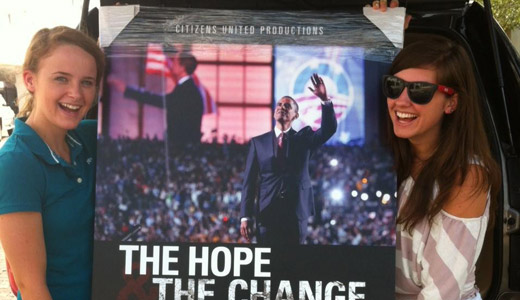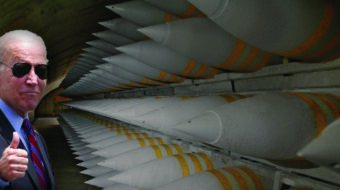
Citizens United, the organization that helped destroy campaign finance laws and define corporations as people, announced recently that it would spend tens of millions of dollars airing an anti-Obama documentary on cable and broadcast television from coast to coast.
According to the promotional website for the film, The Hope and the Change, it “will be broadcast on cable and broadcast tv networks – an historic first for any political documentary.”
The site continues, saying that the film “is set to air 82 times, reaching over 130 million cumulative households, from Sept. 18 through Nov. 6.”
Hope was directed by Stephen Bannon, who made the Sarah Palin fan piece The Undefeated, along with a host of other documentaries pushing Republican messages. Producer David Bossie is the president of Citizens United.
The film features 40 Democratic and independent voters in swing states who pulled for Obama in 2008, but have become disenchanted with him. It debuted at the Republican National Convention, and its television debut was on HDNet. The producers have paid cable and broadcast networks and stations across the country to play it as well.
Bossie compares himself to left-wing filmmaker Michael Moore, and told several press outlets that he was impressed with Moore’s anti-Bush documentary Fahrenheit 9/11. The difference, however, is that Hope is not intended to make money, but is instead an advertisement costing millions of dollars – that would have previously been illegal.
“This is why I did ‘Citizens United,'” Bossie, quoted in Politico, said, referring to the landmark 2010 case his organization brought before the Supreme Court. The court’s verdict in CU’s favor changed federal campaign finance laws.
“This would have been a criminal act under McCain-Feingold before my court case,” Bossie continued.
Airing the film wouldn’t have been a criminal act before the Citizen’s United victory, but it would have been prohibited. It was Bossie’s organization’s previous attempt to broadcast such a movie that led to the 2012 court decision.
According to the 2002 McCain-Feingold Act, corporations and unions were not allowed to use money from their general fund for electioneering, including for producing or broadcasting films.
In 2008, CU produced Hillary: The Movie, and attempted to air it on the Dish Network. The Federal Elections Commission sued to stop the film from showing, and the federal district court in Washington, D. C., agreed, finding that the documentary actually constituted a long version of a campaign commercial, paid for by Citizens United.
CU previously argued that Moore’s film, Fahrenheit 9/11, also constituted illegal campaign contributions by big corporations, but the FEC dismissed the claim, finding that the main intent of the studio and distributor was to engage in commercial activity.
Citizens United appealed the district court’s decision to prohibit their anti-Clinton documentary to the Supreme Court. In 2010, the court handed down its decision, ruling in favor of Bossie’s organization. In doing so, the Supreme Court interpreted the first amendment as protecting not only the speech of individuals, but also of organizations, including multi-national corporations. The effect was to allow corporate America to pump millions of dollars into federal campaigns.
Unions were also allowed to do the same by the decision, but opposed it on the grounds that corporations could easily outspend the labor movement.
“Bannon traveled to Colorado, Florida, Iowa, North Carolina, Ohio, Pennsylvania, and Virginia to search out these authentic American stories from citizens who have lost faith in their president,” the hour-long documentary’s press materials state. “President Obama campaigned in 2008 on ‘Hope’ and ‘Change’ and what these stories from Americans show is that they are disappointed in the direction of the country.”
Of course, more than half the country disagrees, according to the most recent opinion polls. Nonetheless, neither Citizens United nor any other multi-million dollar, corporate funded political action committee is making a movie showcasing their voices.
Photo: CU staff members with poster, via film’s website.












Comments